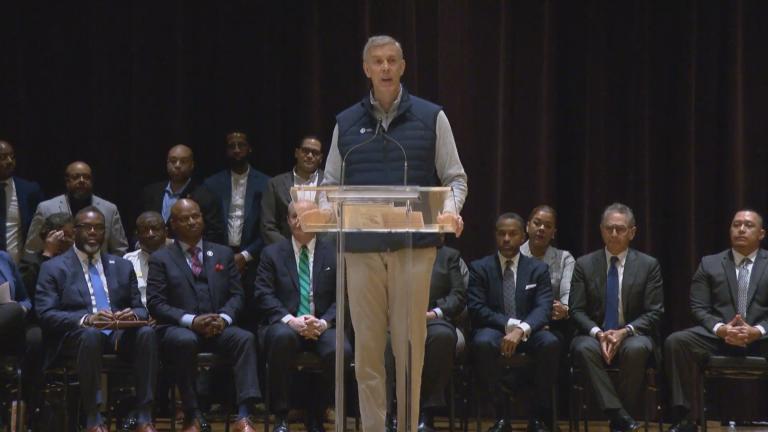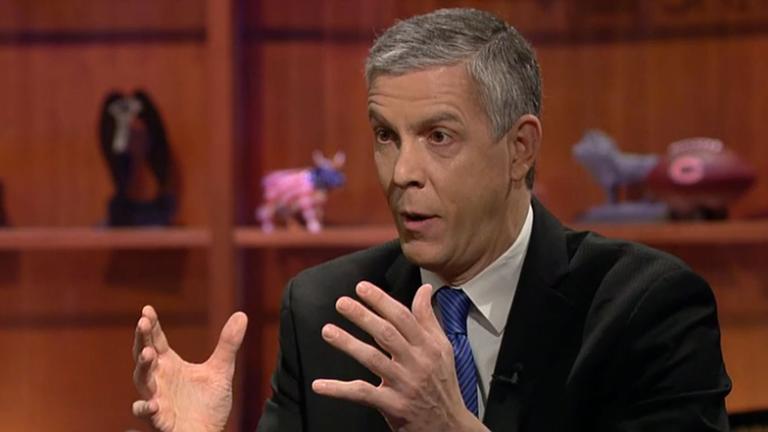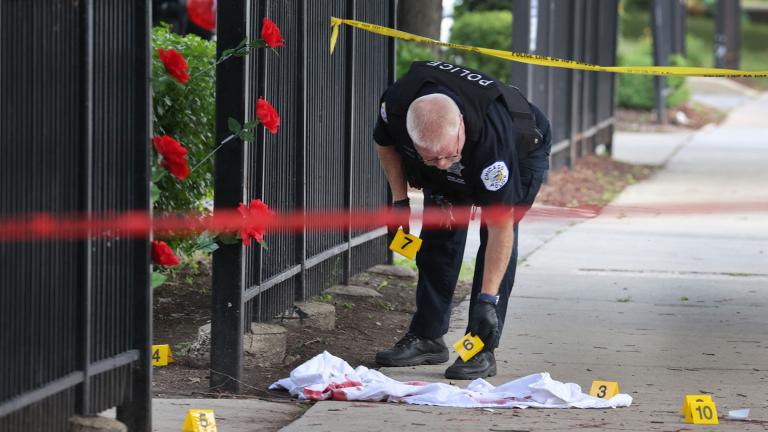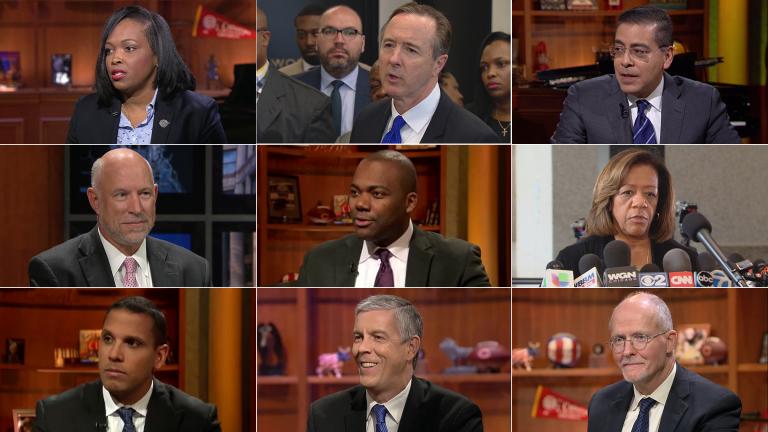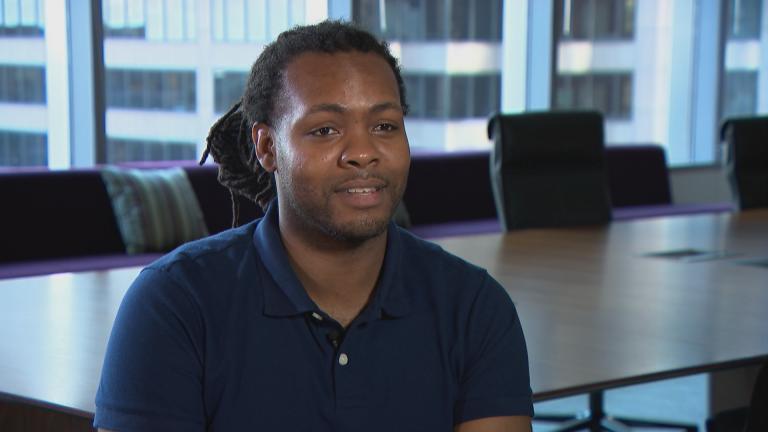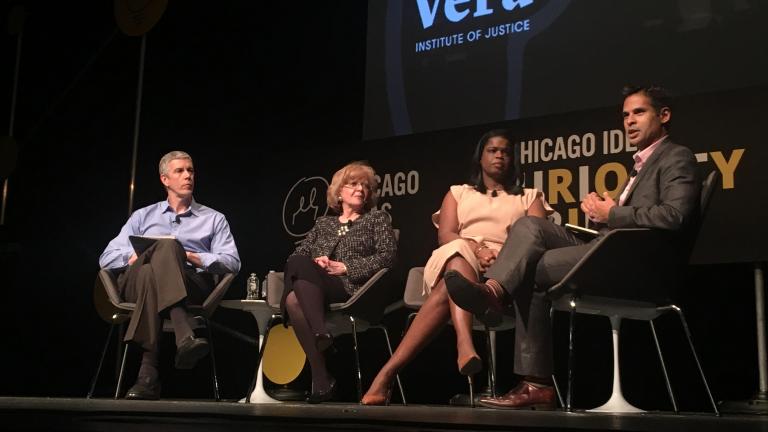Video: We’re more than a year out from Chicago’s mayoral election. But the race is already heating up with one potential candidate slamming the city’s approach to violence. Amanda Vinicky joins “Chicago Tonight” with more. (Produced by Amanda Vinicky)
Former Secretary of Education Arne Duncan blasted Mayor Lori Lightfoot’s public safety strategy as a complete failure on Wednesday during a speech to the Chicago Chamber of Commerce, the clearest sign yet that he may be gearing up to run for mayor of Chicago in 2023.
Duncan, who led the Chicago Public Schools from 2001 until 2009 when he joined former President Barack Obama’s cabinet, said the Chicago Police Department was “in crisis” and called for a complete re-evaluation of how the city tackles crime and violence. Officers should focus only on violent crime, and the city should hire non-sworn workers to address everything from property crime to traffic accidents, he said.
“It doesn’t have to be this way,” Duncan told reporters during a virtual news conference after his speech to the chamber, which was closed to the public. “We are crazy to keep doing what we are doing.”
After Obama’s term ended, Duncan founded Chicago CRED, a violence prevention organization, and serves as a managing partner of the Emerson Collective.
Duncan did not mention Lightfoot by name, and told reporters his criticism was not personal, but motivated by his “extraordinary concern” about the surge in violence in Chicago that saw more than 800 homicides and soaring numbers of carjackings in 2021.
When asked by reporters Wednesday if he was planning a mayoral run, Duncan said he is “absolutely thinking about it.”
Pressed by reporters, Duncan declined to call for the resignation of Chicago Police Supt. David Brown, even as he said Chicago’s violence surge was due in part by a “crisis of leadership.”
Duncan was directly critical of Brown’s decision to move officers assigned to patrol Chicago’s 22 police districts to citywide anti-crime teams. That has left Chicago’s neighborhoods under policed and allowed a “vicious cycle” of retaliation to fuel violent crime to take root, Duncan said.
Duncan was also critical of Lightfoot’s decision to eliminate 618 vacant positions from the Chicago Police Department as part of the city's 2021 budget. Amid calls to significantly reduce spending on police, CPD’s 2020 budget dropped by approximately 3.3% to $1.69 billion in 2021.
In 2022, the budget for the Chicago Police Department willl rise by $189 million, with more than 75% of that increase earmarked to cover the cost of the pay raise called for in the new contract with the Fraternal Order of Police Lodge 7.
“We have a department that has been defunded and demoralized,” said Duncan, noting that Chicago has more officers than New York or Los Angeles but has significantly higher rates than violent crime.
In a September 2020 speech to the City Club of Chicago, Duncan proposed reducing the size of the Chicago Police Department from approximately 13,000 officers to approximately 11,000 officers. That would free up approximately $100 million that should be used for violence prevention efforts.
Duncan did not repeat that proposal Wednesday, and instead said that the number of officers is less important than how they are deployed and what they are asked to do.
A spokesperson for Lightfoot’s campaign said Duncan’s proposal would actually defund the Chicago Police, while Lightfoot “has fought to provide our officers with the resources they need to keep our communities safe.”
“Duncan wants Chicagoans to believe we have to choose between a well-funded social safety net and a fully resourced police department. He’s wrong,” said Dave Mellet, the executive director Light PAC, Lightfoot’s political action committee.
City leaders must also accelerate the pace of reforms required by a federal court as detailed by a consent decree designed to ensure that the Chicago Police Department does not routinely violate the constitutional rights of Black and Latino Chicagoans, Duncan said.
The most recent report from the team tracking the Chicago Police Department’s progress found that it missed 40% of the agreement’s deadlines.
“We must put reform in a much higher gear,” Duncan said. “We have to do it faster.”
Brown said on Jan. 4 that his No. 1 priority in 2022 for reducing violence in Chicago is to “build trust” with Chicagoans.
That cannot happen without real progress on reform efforts, Duncan said.
Duncan called it a “perversion of where we should be” that the city routinely spends twice as much every year settling lawsuits alleging police misconduct than on violence prevention efforts.
Duncan also criticized Lightfoot’s proposal to fight crime by going after the profits earned by Chicago’s gangs and their leaders.
That will “invite abuse” and “makes no sense” because Chicago’s gangs are fractured and leaders “don’t have any assets to speak of,” Duncan said.
Too often Chicago’s leaders have obscured the root causes of crime by offering misleading data about crimes committed by those released on bail or on electronic monitoring, Duncan said.
“Let’s be honest about what the issues are,” Duncan said.
The next mayoral election is set for Feb. 23, 2023.
Contact Heather Cherone: @HeatherCherone | (773) 569-1863 | [email protected]

